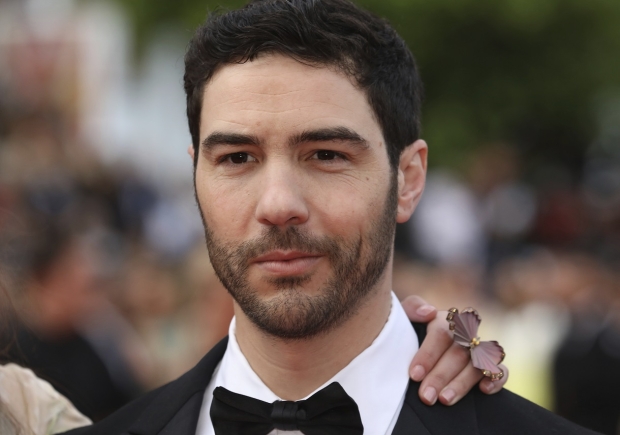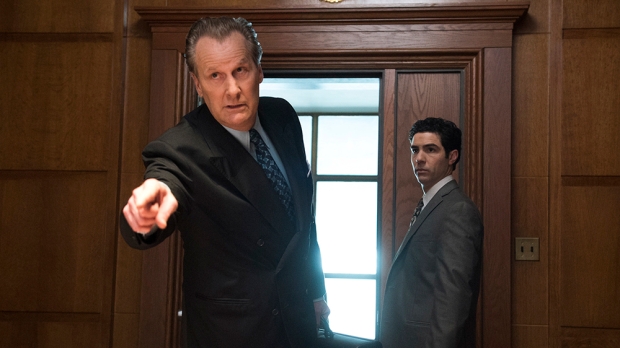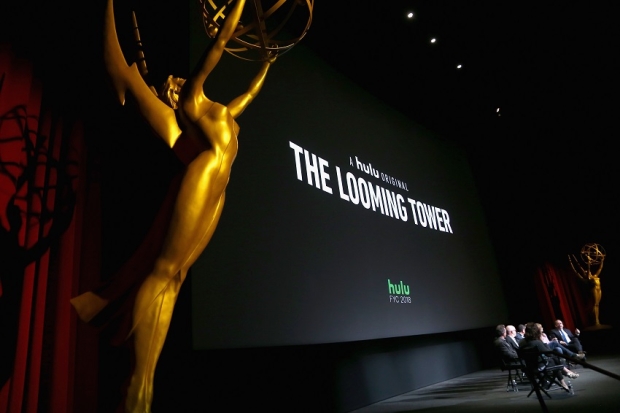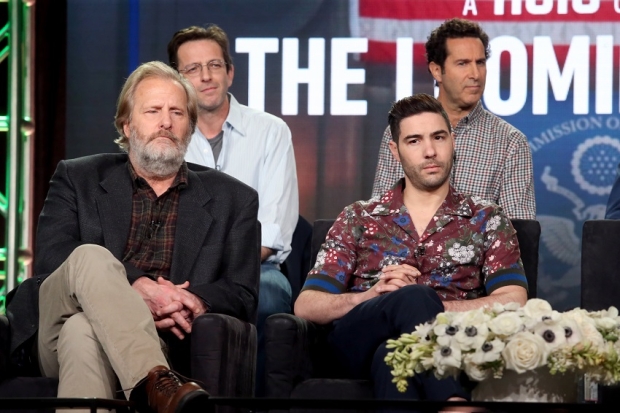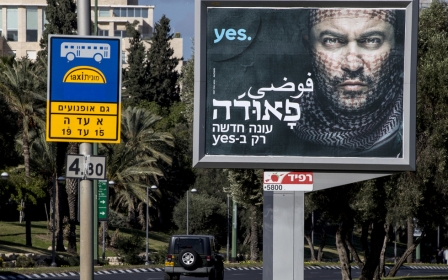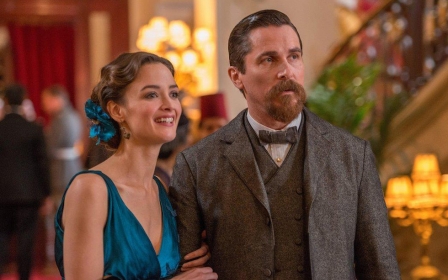In the shadow of 9/11 with director Ali Selim: 'Islam has been hijacked'
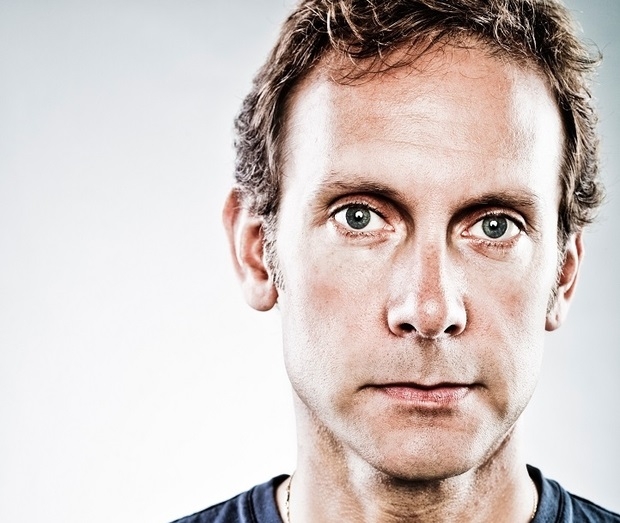
Every time Ali Selim and his father would take a flight from Minnesota to Egypt or they would check into the Hilton Zamalek Hotel, set on a Nile island in Cairo, his father would ask him to read Lawrence Wright’s 2006 non-fiction Pulitzer-winning book, The Looming Tower: Al-Qaeda and the Road to 9/11.
Sometimes he would ask him to read it from cover to cover; other times he would select certain chapters that he liked listening to.
When his father’s health become frail and he started losing his eyesight, Ali bought him the audio book, read by a New York actor. But his father said he “did not trust him” because he couldn’t pronounce the Arabic names.
Ali's father, Dr Mohamed Selim, died in 2015 at the age of 91. Three years later, the Egyptian-American director would come to work on Hulu’s new TV production, The Looming Tower – an adaptation of the book and one of the most acclaimed TV shows of the year. The success of its first season – which has earned four primetime Emmy nominations – could make way for a second season in the pipeline.
Ali wrote two episodes and directed another two of the show’s first 10-episode season. His collaboration with the Looming Tower’s showrunner, Dan Futterman, dates back to 1993 when the former cast the latter as an actor in a commercial.“[Futterman] knew about my deep knowledge of the Wright book. He knew how many times I’ve read it out loud to my father [in 2006]. He knew how passionate I am about that story - about its brilliant presentation of the Arab grievance, which is clearly spelled out,” he told MEE.
[Futterman] knew how many times I’ve read it out loud to my father [in 2006]. He knew how passionate I am about that story - about its brilliant presentation of the Arab grievance, which is clearly spelled out
- Ali Selim
The book is a historical account of the formation of al-Qaeda and the circumstances that led to 9/11, and has been long regarded as the definitive document on the event that altered the West’s relationship with the Arab World.
Ali became aware of the book in 2006, when a chapter of it was first printed in the New Yorker magazine. The chapter charted the story of Sayyid Qutb - a Muslim Brotherhood leading figure and intellectual whose work is regarded as highly influential on al-Qaeda - his travels to America and what he experienced there that turned him against the West.
“The way the story was laid out was just thrilling. I’m certainly not saying you’d agree with it, but you’d start to understand how grievance develops, and how when it’s unheard, it festers. You feel a sense of fullness of the man as a man. But that’s not the material for a big US TV show, because personally, I really don’t know how this story would land with anybody anywhere in the world,” Ali said.
Ali’s father, Mohamed, was an academic, who taught economics at the University of St Thomas in St Paul Minnesota for 50 years and was head of the economics department for 35.
In 1973, Mohamed founded the Centre for Senior Citizens’ Education, now named The Selim Centre for Lifelong Learning. Like Qutb, who was sent to the US to study in 1948, Mohamed also travelled to the US on a scholarship in the early 50s. “I felt there was one degree of separation between [Qutb and my father],” Ali said.
While the larger part of the book zeros in on the mindsets of the 9/11 masterminds, the series directs its focus towards the stand-off between the FBI and the CIA that both Wright and Futterman hold partially responsible for permitting the attacks to happen.
I think Dan wanted a different perspective, of someone like me caught between those two worlds
- Ali Selim
The main antagonist of the story is not al-Qaeda. CIA agent, Martin Schmidt, played by Golden Globe nominee Peter Sarsgaard, is almost immediately blamed for thwarting O'Neill’s efforts not only in curtailing al-Qaeda’s sweep, but in understanding the roots of its hostility.
The pompous, hermetic Schmidt – who is based on the real life former CIA agent Michael Scheuer – is only interested in self-glory. The information he would withhold from sharing with the FBI might have helped prevent the 9/11 attacks.
Before The Looming Tower
Born in Saint Paul, Minnesota, to an Egyptian-born father and a mother of German descent, Ali began his career in the late 80s as the director of various award-winning TV commercials. His 1989 YMCA PSA received the Gold Lion award at the Cannes Advertising Film Festival.
In 2005, Ali directed and wrote his first narrative feature, Sweet Land, an endearing rural tale about a Swedish mail order bride adapting to life in a Norwegian-American community in Minnesota after WWI. It is an adaptation of a short story by Will Weaver.
I think I try to bring warmth to the characters that make you wean on and listen in to them
- Ali Selim
Ali cast Futterman as the lead for Sweet Land, but Futterman dropped out of the project to write and produce Capote, the highly acclaimed art-house blockbuster that earned the late Philip Seymour Hoffman his best actor Oscar in 2006.
Futterman’s working relationship with Ali would recommence with the popular Golden Globe-winning psychological drama, In Treatment, which Futterman produced and Ali directed six episodes of.
“Dan brought me to all the TV projects he has ever done,” Ali told Middle East Eye.
‘Caught between two worlds’
The Looming Tower was Ali’s first TV writing gig. In addition to directing the two episodes Y2K and Mercury, he also wrote The General episode and the aforementioned finale, 9/11.
“I think Dan wanted a different perspective, of someone like me caught between those two worlds,” Ali said.
Futterman and Wright, one of the main producers of the series, do not shy away from tackling the US’s shadowy relations with its Arab allies. Egypt is repeatedly named as a primary spot for extraordinary renditions, while a number of the Yemeni intelligence officers are implied to have been complicit with al-Qaeda operatives. No other Arab nation gets it as hard as Saudi Arabia, whose alleged direct responsibility for the attacks is ultimately covered up by the Bush administration.
People need to understand that people are people. That we have a lot of similarities and that it’s destructive to focus on our differences
- Ali Selim
“There’s nothing in the show that is not a proven fact. The CIA and Saudis have a special relationship. The Bush family and the Saudis have a special relationship, and that special relationship is obviously based in the trading of oil,” Ali said.
“The Saudis had a differential treatment in and around the events of 9/11. Nobody ever questioned the fact that men who hijacked the planes were Saudis. I don’t actually think that anything in the show singles out the Saudis apart from these basic facts.”
Fifteen of the nineteen hijackers of the 9/11 planes in 2001 were Saudi nationals. They flew the planes into the World Trade Center’s twin towers, the Pentagon, and a Pennsylvania field. The Saudi government has continuously denied its involvement in the attacks.
While a US government commission said it found no evidence that Saudi Arabia directly funded al-Qaeda, it left open whether individual officials might have.
Arab portrayal
While the number of Arab characters has increased in American television, representation usually remains static, confined to stereotypical characteristics. But one of the biggest accomplishments of The Looming Tower is its comprehensive, multi-dimensional view of the Arab characters. The atypical and nuanced portrayal of Arabs marks another stepping stone in the reformist representation of Arabs in Hollywood.
Not only is this the case with FBI agent Ali Soufan, but also in the portrayal of Yemeni officers and even the terrorists.
Some of their motives remain intentionally vague to avoid oversimplified rationalisation. The show's creators have opted to imply, yet not fully explain some things.
“I think I try to bring warmth to the characters that make you wean on and listen in to them. The message in the interrogation scene between Abu Jandal and Soufan is the message that my dad would’ve wanted to leave the world with: that Islam has been hijacked and completely misinterpreted,” Ali said. “I think this scene should be a required viewing in this crazy political climate we’re living in. People need to understand that people are people. That we have a lot of similarities and that it’s destructive to focus on our differences.”
Abu Jandal later denounced al-Qaeda and Bin Laden, and died in 2015 in a Yemeni hospital.
For a writer and director working in a show governed by a visual structure and a flowing narrative, leaving one’s personal artistic imprint out was a challenge.
Right now, it’s either we learn to talk to one another, or we’re all going to end up killing everybody. End of story
- Ali Selim
“I’ve worked in episodic before where every script has been harmonised by the showrunners and every episode follows in the footsteps of the pilot. This show was different,” Ali said. He asserts that Futterman put his trust in the writers, assembling multiple voices and perspectives within the cohesive whole he was creating.
“The show was shot all at once, so there was no pilot to match to. There were some ideas about when we’d use handheld cameras, and when we’d use [a] traditional standard camera. It wasn’t a rule though. It was an idea that we discussed and explored. As a consequence, every director managed to deliver their own interpretation of the story," he adds.
There’s a scene at the finale that was recreated verbatim from a congressional hearing, where Richard Clarke apologises to the public, stating that the American government had failed them. The scene begs the question: can such rivalry between the CIA and FBI happen again?
According to Ali, of the 17 intelligence agencies, only the FBI and the CIA are well-known, while the rest are often left out of the conversation. All of the agencies have been created at different times in history for different reasons.
The FBI was created back in 1908 as an arm of the justice department to investigate federal crimes against Americans across state lines. “The CIA, on the other hand, was created in the late 40s after World War II when it was discovered that the main force that wins wars is intelligence.” he says.
As the 17th anniversary of 9/11 approaches, in an ideal world, the dialogue between the West and the Muslim World should have reached quite a progressive stage by now. But with the rise of Donald Trump and the far right in Europe, it feels as though global society has gone back to square one.
“Everything is driven by fear. Everything is driven by protectionism,” Ali said. “The only thing that could save us now is if we all talk to each other. We’re beyond Muslim grievances or American fears. Right now, it’s either we learn to talk to one another, or we’re all going to end up killing everybody. End of story.”
The Looming Tower is now available on Hulu and Amazon Prime.
New MEE newsletter: Jerusalem Dispatch
Sign up to get the latest insights and analysis on Israel-Palestine, alongside Turkey Unpacked and other MEE newsletters
Middle East Eye delivers independent and unrivalled coverage and analysis of the Middle East, North Africa and beyond. To learn more about republishing this content and the associated fees, please fill out this form. More about MEE can be found here.


